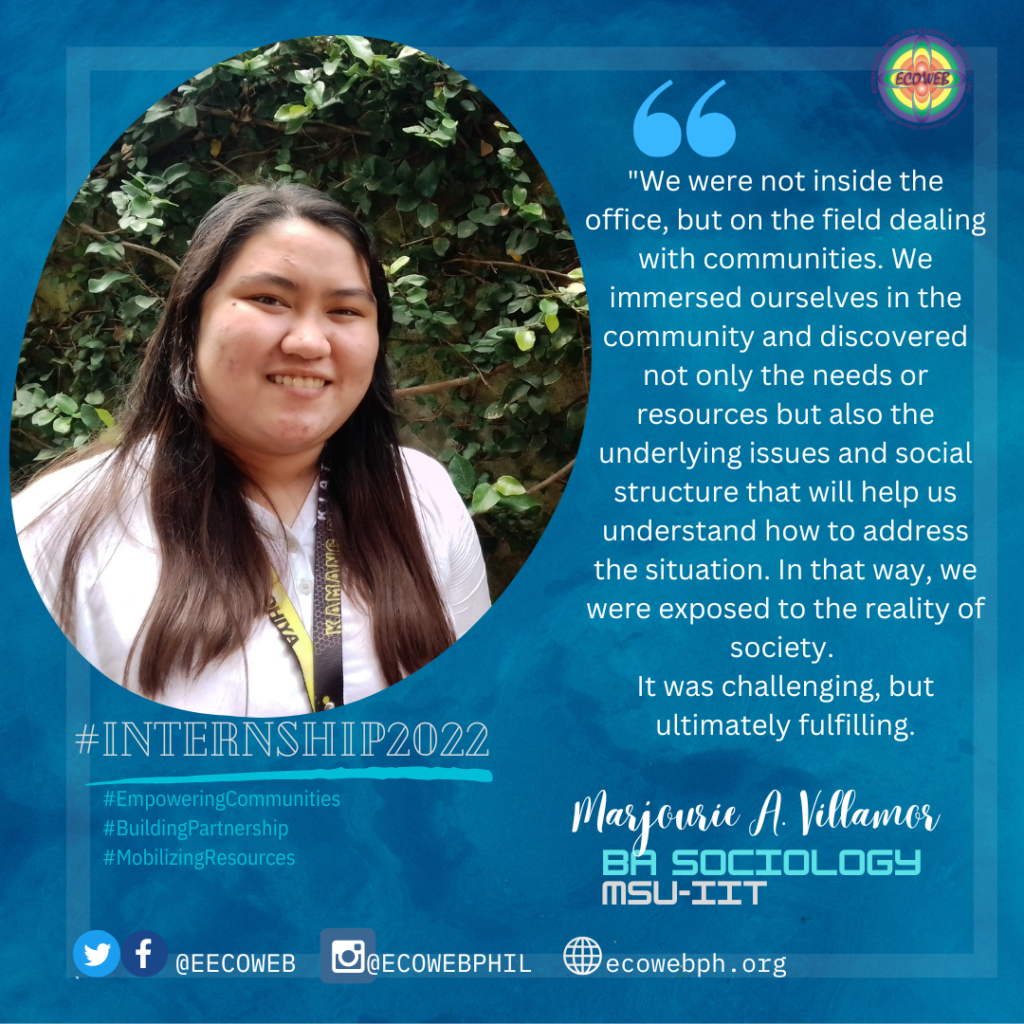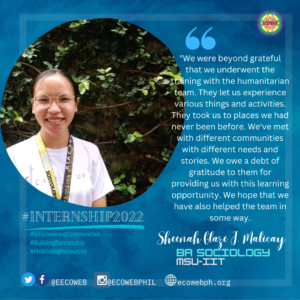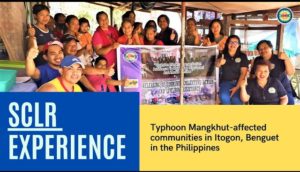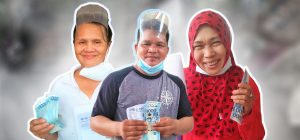By Marjourie A. Villamor
(Villamor is a BA Sociology student of Mindanao State University-Iligan Institute of Technology (MSU-IIT) who completed her 35-day internship program in ECOWEB Inc. She is one of the four interns who conducted community profiling, virtual monitoring of project beneficiaries, assisted the learning review of humanitarian intervention for vulnerable and conflict-affected communities, and produced documentations.)
For a month, my on-the-job training is not inside the office, but on the field dealing with various communities. This might be a great practice for sociology, a course that deals with people and society.
With co-interns, we immersed ourselves in the community and discovered not only the needs or resources, but also the underlying issues and social structure that will help us understand how to address the situation. In that way, we were exposed to the reality of society.
I learned different things regarding humanitarian work and response. This is more than just providing relief goods and cash assistance to survivors. It’s a humbling experience to work with such a willing organization to help various communities develop sustainable livelihoods and gear them towards total development. As a concerned citizen, I felt I wanted to be one of the voices of those who have been discriminated against, marginalized, and most vulnerable.
I realized that there are privileged people who are willing to help those in the margins of society. It melts my heart to see vulnerable groups get the help they need and have their voices heard.
ECOWEB is doing their best to reach out to the most underserved sectors of society by providing various programs and projects as a committed institution in realizing their mission of building partnerships, in mobilizing various resources, and in empowering the communities. The organization’s survivor-community led response (sclr) approach receives my personal praise and commendation. As far as I can tell, it is an effective strategy with the objective of assisting and empowering those affected by the crisis.
This strategy is beneficial to stakeholders because it increases the community’s involvement in the process. The stakeholders will improve the extent of working together and in developing their sense of solidarity. I learned these from the various self-help groups (SHGs) whom we interviewed. The approach is truly workable to achieve together the organizational goals. By leading and working together, the community is empowered to find out its full potential and make use of their skills to solve problems in self-reliance and in solidarity with other survivors.
From this internship, I’ve learned to face the real world and to talk to different people. I gathered my self-confidence and learned to improve our teamwork with my co-interns. Though I felt like I failed myself when I’m criticized, I took that as a challenge to improve, to move forward, and to be better instead of pushing myself backwards.
The experience inspired me to have deeper introspection to assess my strengths and weaknesses when dealing with realistic scenarios. I realized that I needed to improve my communication skills and I must perform beyond my comfort zones. Although I am not normally exposed to work under pressure, this is a challenge to shoulder on.
Moreover, I have reflected that I was actually facing my fears. I shouldn’t shy away from asking bold questions and in relating with diverse people with different beliefs, cultures, and social statuses. It depicted the vibrancy of life and sprung new awareness about myself.
I can say that I gained more than just experience when I completed my internship here. I got the learning and exposure that will push me forward as I continue my journey as a sociology student. It will always be something that I will look back on and be grateful for.
I am thankful to have worked with staff who are accommodating and appreciative of our jobs. They made it possible for us to experience the reality of interacting with people from different walks of life. Sometimes, I couldn’t help overthink if we have been a burden to the team, especially because they have many tasks to accomplish other than guiding us.
This is a worthwhile memory knowing that I’ve been part of an organization that helps vulnerable people in a non-traditional way. As I dealt with them, I gained empirical life lessons. I affirmed that experience is a great teacher and the process of gaining this knowledge is incomparable.
It was challenging, but it was ultimately fulfilling.




